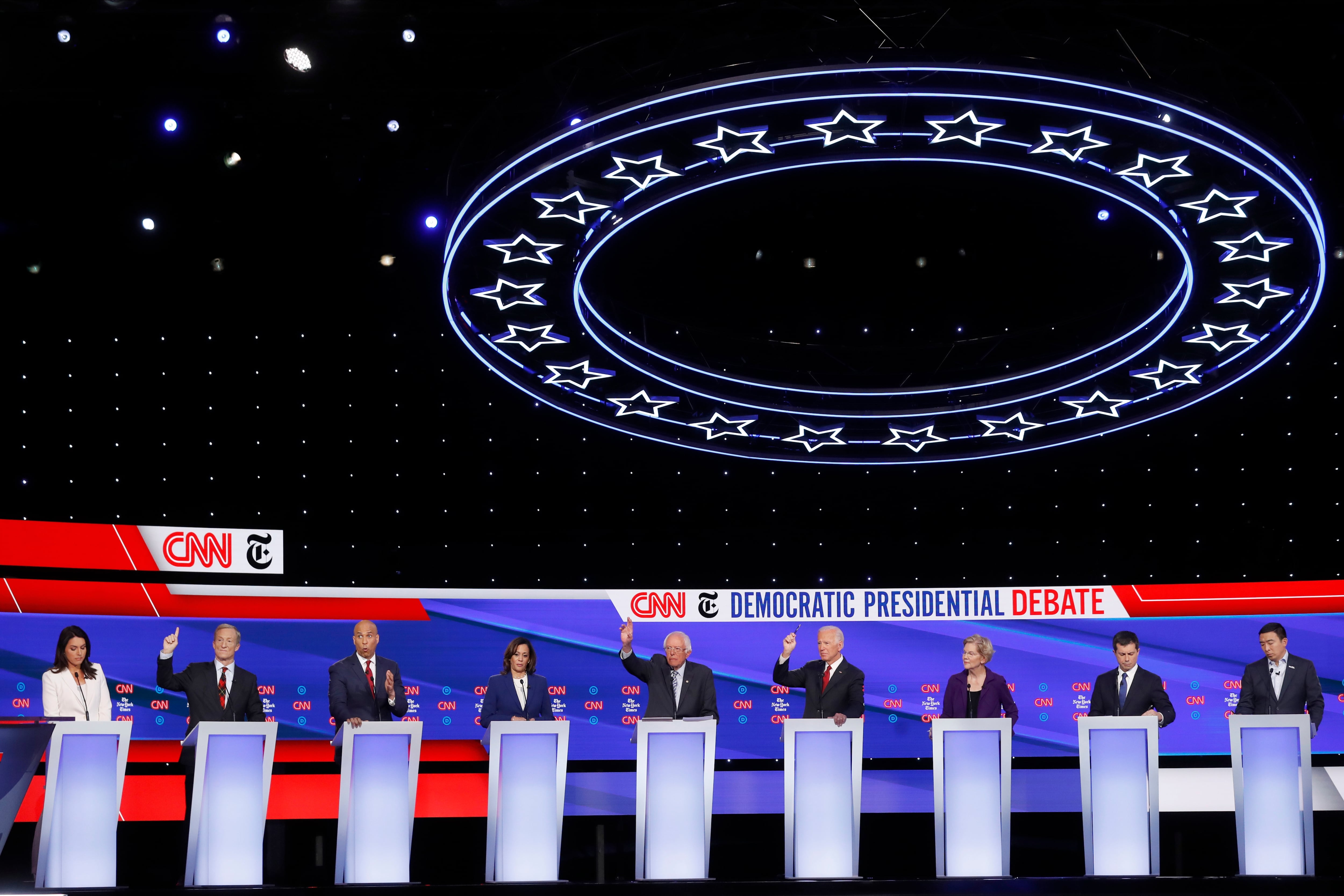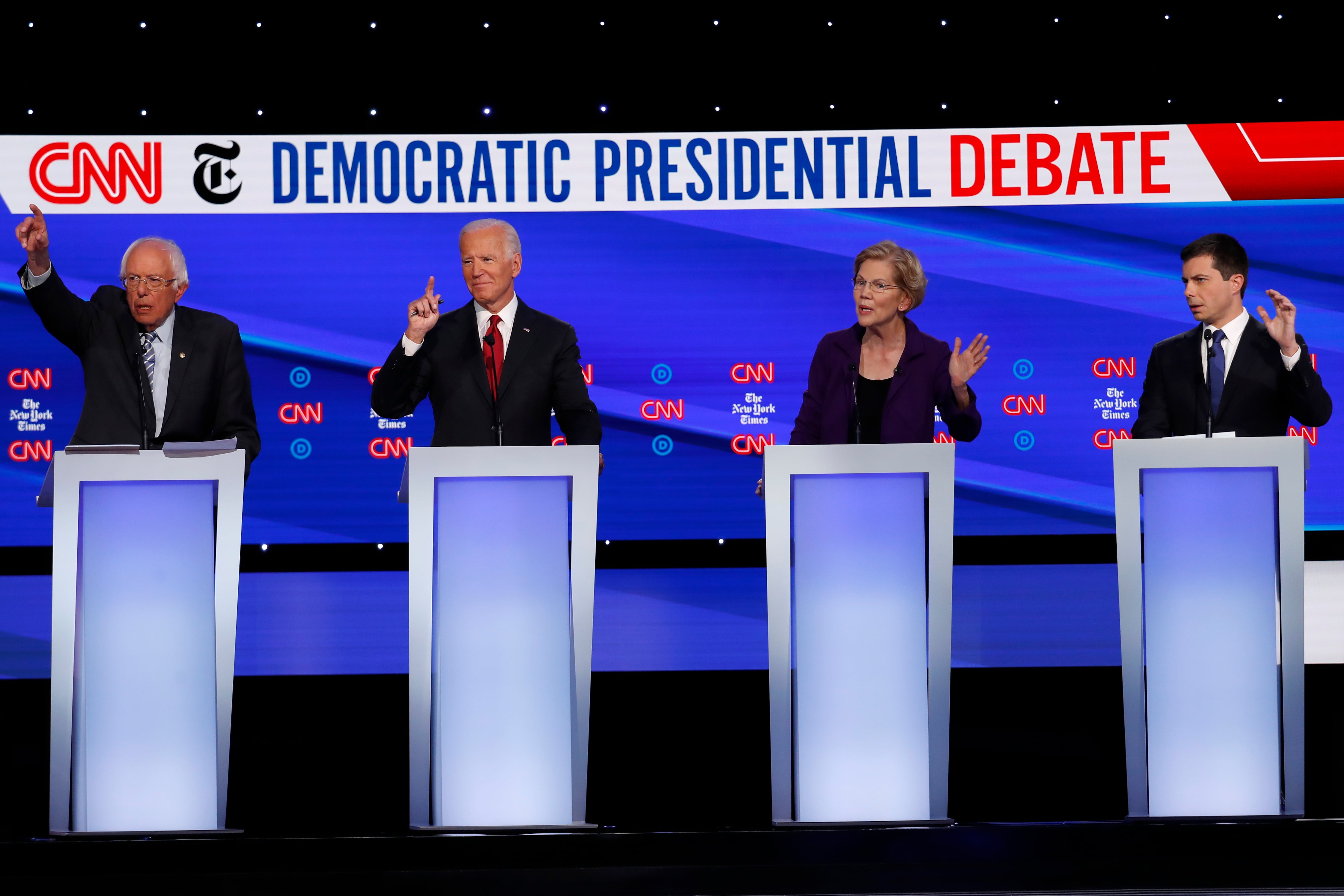One week after Iranian rockets damaged military bases in Iraq hosting U.S. troops, the Democratic candidates vying to replace President Donald Trump attacked his foreign policy plans as short-sighted and laid out their own vision of what the next commander in chief needs to do to make America safer.
The seventh debate of this campaign cycle, held in Iowa less than a month before the first primary votes are set to be cast, had the fewest candidates on stage (only six qualified) but more national security and military policy discussion than any of the previous events.
The candidates Tuesday offered near unanimous condemnation of Trump’s policies — Minnesota Sen. Amy Klobuchar said the president is “taking us toward another war” — and promised to work with allies to calm tensions in the Middle East and bring more U.S. troops home from overseas combat zones.
But the presidential contenders also offered some sharp contrasts in their military plans. Asked if all U.S. forces should be withdrawn from the Middle East, Klobuchar and former Vice President Joe Biden both said that a full pull-out could create more chaos in the region.
RELATED

“I think it's a mistake to pull out the small number of troops that are there now to deal with ISIS,” Biden said. “ISIS is going to reconstitute itself if we're in a position where we have to pull our forces out Americans and leave the entire region.”
Vermont Sen. Bernie Sanders and Massachusetts Sen. Elizabeth Warren, however, said those servicemembers (around 5,000 are on the ground in the region) need to come home.
“We should stop asking our military to solve problems that cannot be solved militarily,” said Warren of the instability in Iraq, Syria and Iran. “Our keeping combat troops there is not helping. We need to work with our allies, we need to use our economic tools, we need to use our diplomatic tools.”
Each of the candidates laid out their arguments for why they were better equipped to run the military than Trump. Biden cited his work as vice president, Warren her experience on the Senate Armed Services Committee. She echoed her past work to close the “revolving door” between the defense industry and the Pentagon.
Former South Bend Mayor Pete Buttigieg cited his tour of duty in the Navy, which he said gives him a “personal” perspective on military policies.
“The next president is going to be confronted with national security challenges, different in scope and in kind from anything we've seen before,” he said. “Not just conventional military challenges, not just stateless terrorism, but cyber security challenges, climate security challenges, foreign interference in our elections.
“It's going to take a view to the future, as well as the readiness to learn from the lessons of the past.”
Businessman Tom Steyer said his lack of traditional national security experience was an advantage, not a failing of his campaign.
“We are hearing 20 years of mistakes by the American government in the Middle East,” he said. "(We need) an outside perspective, looking at this and actually dealing with the problems as they are … It’s time for someone from the outside to have a strategic view about what we’re trying to do and how to do it.”
RELATED

All of the candidates backed passing new congressional authorizations for the use of military force overseas. Buttigieg was the most specific, repeating his past pledges to require any new authorization to have an automatic three-year sunset.
On Iran, Biden said the next president must rally America’s estranged allies to force Iran back into the Obama-era nuclear agreement Trump abandoned in 2018. Several others also echoed that sentiment.
The next Democratic debate is scheduled for Feb. 7, after the completion of the Iowa caucuses and absentee voting has begun in Maine and California. It will also take place a few days after Trump’s annual State of the Union address, and possibly in the middle of the Senate impeachment trial regarding charges the president withheld foreign aid to Ukraine for political favors.
Leo covers Congress, Veterans Affairs and the White House for Military Times. He has covered Washington, D.C. since 2004, focusing on military personnel and veterans policies. His work has earned numerous honors, including a 2009 Polk award, a 2010 National Headliner Award, the IAVA Leadership in Journalism award and the VFW News Media award.
Joe Gould was the senior Pentagon reporter for Defense News, covering the intersection of national security policy, politics and the defense industry. He had previously served as Congress reporter.





